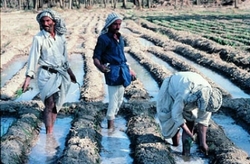The National | Editorial | Jan 13, 2011
Cheap food. Few things are more important to citizens than access to affordable staples. As The National reported yesterday, the threat of rising food costs has prompted the UAE to establish a strategic food reserve to guard against price spikes and sudden shortages. In the short-term, this is a laudable strategy.
But long-term food security will require more than building warehouses for rice or wheat. Given the high cost of producing food at home, the only sustainable option is to look beyond our borders.
Wealthy states may have the means to shop for the best prices abroad, but regional cooperation strengthens their hand. Not only do such food purchasing and producing agreements cut transport and production costs, they allow neighbours to share the burdens of a collective challenge.
In Iraq, whose rich soils of the Tigris and Euphrates river basin were once a vast breadbasket, agricultural capacity is underdeveloped. Years of war, drought and diminished spending on infrastructure are significant hurdles, but with foreign investment in the country's farming sector, its harvests will improve. Helping to develop a newly fertile crescent so close to the Gulf has clear benefits to the UAE and others.
But regional food security is about more than financial commitments. It's also about resource management. Iraq, for instance, is dependent on water sources originating in Turkey and Syria, whose upstream dam building has weighed heavily on their downstream neighbour. A water master plan that encourages trans-border water sharing would be a boon to the region. Food producing nations such as Syria and Iraq would benefit from greater access to irrigation waters, while food importing states like the UAE would reap the rewards of greater access to food stocks.
A similar calculus holds for other parts of the world where food security and the price of imports are perennial concerns. In the north and south of Sudan, cooperation agreements with each other, and neighbouring states, are seen as one way to bolster regional stability. Along the Nile River, basin-wide water sharing agreements are vital to food security, given the river's importance as an irrigation source.
Gulf governments have focused almost exclusively on controlling land where food is grown, investing in projects and buying land in North Africa, Sub-Saharan Africa and central Asia. This is one approach. But as the Iraqi foreign minister, Hoshyar Zebari, once noted, perhaps the better strategy would be to look for food closer to home. "Why not help us revive Iraq's agriculture, thereby helping ensure the Gulf's food security locally?" he wondered in 2009. Perhaps it's time to start crafting an answer.
Food security requires regional cooperation
-
 The National
The National
- 13 January 2011
Who's involved?
Whos Involved?
Carbon land deals
Dataset on land deals for carbon plantations
07 Oct 2025 - Cape Town
Land, life and society: International conference on the road to ICARRD+20
Languages
- Amharic
- Bahasa Indonesia
- Català
- Dansk
- Deutsch
- English
- Español
- français
- Italiano
- Kurdish
- Malagasy
- Nederlands
- Português
- Suomi
- Svenska
- Türkçe
- العربي
- 日本語
Special content
Archives
Latest posts
-

CAR offers land ownership using cryptocurrency
- IT Web
- 23 June 2025












